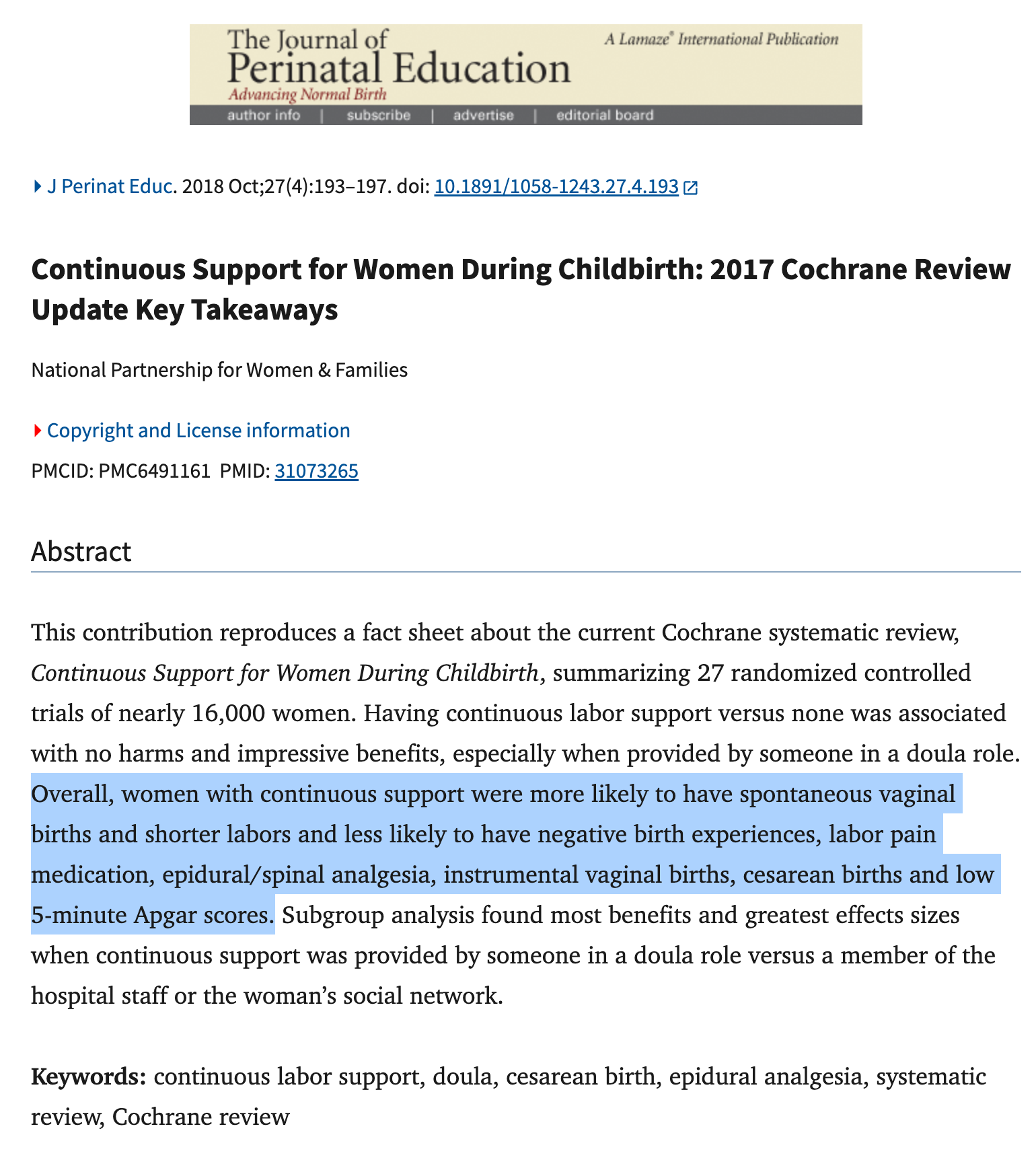IN THIS LESSON
Topics Covered:
Evidence-based research on the impact of doulas on birth outcomes
Benefits of continuous labor support for birthing families
How doulas reduce the need for medical interventions and cesarean sections
Emotional and psychological benefits of having a doula
Evidence-Based Research on the Impact of Doulas on Birth Outcomes
Research over the years has shown that continuous labor support provided by doulas leads to improved outcomes for both birthing individuals and their babies. Numerous studies, including those summarized in the Cochrane Review, have consistently demonstrated the positive effects of having a doula present during childbirth. Key findings from this research include:
Shorter Labor Duration: Doulas help reduce the length of labor by providing continuous emotional and physical support. Women with doula support experience, on average, shorter labors than those without.
Lower Use of Medical Interventions: Women who have doula support are less likely to require medical interventions such as epidurals, forceps-assisted deliveries, or vacuum extractions.
Reduced Risk of Cesarean Sections: Doula-supported births are associated with lower cesarean rates. The presence of a doula helps women feel more confident and less fearful during labor, which can result in fewer complications requiring cesareans.
Higher Satisfaction with Birth Experience: Mothers report greater satisfaction with their birth experience when supported by a doula. They feel more in control and supported in their decision-making, which contributes to a more positive overall experience.
Key studies to note:
The Cochrane Review of continuous support in childbirth (2017) concluded that having continuous support (especially from doulas) during labor increases the likelihood of spontaneous vaginal births and improves satisfaction with the birth process.
Research published in The Journal of Perinatal Education (2013) demonstrated that women who had doula care were more likely to have a positive childbirth experience and less likely to use pain medication or undergo medical interventions.
2. Benefits of Continuous Labor Support for Birthing Families
Doulas provide continuous support throughout labor, which is different from the intermittent care provided by doctors or nurses who may have other responsibilities or shift changes. The benefits of this continuous presence include:
Uninterrupted Attention: Doulas offer unwavering attention, helping birthing individuals feel safe and heard throughout the entire process, something that is often difficult for medical staff to provide consistently due to the demands of hospital settings.
Emotional Reassurance: Knowing that someone is there solely to support their emotional and physical needs helps birthing individuals feel more relaxed and in control. The calming presence of a doula can ease anxiety, which in turn helps labor progress more smoothly.
Personalized Care: Doulas take the time to understand the preferences, fears, and desires of their clients. They tailor their support to the specific needs of each birthing person and their family, ensuring that the family’s goals for labor and birth are respected.
Support for the Partner: Doulas also provide support to the birth partner, helping them engage in the process in a way that makes them feel confident and connected. This can deepen the partner’s involvement in the birth and alleviate some of their stress, knowing a professional is there to guide them.
The consistent emotional and physical support doulas provide not only benefits the birthing person but also contributes to a smoother birth experience for the entire family.
3. How Doulas Reduce the Need for Medical Interventions and Cesarean Sections
Doulas play a critical role in reducing the use of medical interventions during labor by offering non-medical comfort measures and fostering an environment of calm and confidence. Here’s how doulas reduce the need for interventions:
Encouraging Movement and Position Changes: Doulas help birthing individuals move, change positions, and try different techniques to facilitate labor progress. Movement and upright positions during labor are associated with a reduction in the need for medical interventions such as Pitocin (to speed up labor) or assisted deliveries (forceps or vacuum extraction).
Promoting Natural Pain Management: By using massage, breathing techniques, and other comfort measures, doulas help reduce the need for epidurals and other pain medications. This natural pain management reduces the likelihood of a “cascade of interventions” that can sometimes follow epidural use (e.g., increased risk of needing a cesarean section due to slowed labor).
Fostering a Calm, Low-Stress Environment: Stress and anxiety can slow down labor and increase the need for interventions. Doulas work to create a supportive, low-stress environment that encourages the natural progression of labor.
Advocating for the Birthing Person’s Preferences: Doulas help their clients communicate their preferences to healthcare providers, ensuring that the birthing person’s desires are respected. This advocacy can prevent unnecessary interventions by encouraging healthcare providers to consider the client’s wishes when making decisions.
Reducing Fear of Childbirth: Fear and tension during labor can increase the likelihood of interventions. Doulas provide education, reassurance, and emotional support that helps the birthing person feel confident and empowered, which can contribute to a smoother, intervention-free birth.
Research shows that women who have continuous labor support, particularly from a trained doula, are:
39% less likely to have a cesarean birth
15% more likely to have a spontaneous vaginal birth
10% less likely to need pain medications
31% less likely to be dissatisfied with their birth experience (Cochrane Review, 2017)
4. Emotional and Psychological Benefits of Having a Doula
In addition to the physical benefits, having a doula provides significant emotional and psychological advantages for both the birthing individual and their family:
Emotional Security: The presence of a doula can make the birthing person feel emotionally secure, knowing that they have a trusted advocate by their side who is focused on their well-being and preferences. This feeling of security can significantly reduce feelings of fear and anxiety during childbirth.
Increased Confidence: With continuous reassurance from a doula, the birthing person often feels more confident in their ability to handle labor, make informed decisions, and trust their body’s natural process.
Decreased Risk of Postpartum Depression: Studies suggest that women who have doula support during labor and birth may have a lower risk of postpartum depression. The emotional and practical support provided by a doula helps create a more positive birth experience, which can contribute to better mental health in the postpartum period.
Empowerment Through Education: Doulas empower their clients by providing evidence-based information and guidance throughout pregnancy and labor. This education helps birthing individuals feel more prepared and confident about the choices they make during birth.
Strengthened Partner Relationships: Doulas often help improve the partner’s experience as well. By supporting the partner and guiding them through how best to assist during labor, doulas can help the partner feel more involved, which strengthens the connection between the couple during the birth process.
Having a doula present during childbirth fosters a nurturing and supportive environment that leads to a more positive and satisfying birth experience, which has lasting emotional and psychological benefits for the entire family.
-
Studies show that doula-supported births are associated with shorter labor, fewer interventions, and higher satisfaction with the birth experience.
Doulas provide emotional reassurance, comfort, and advocacy, helping birthing individuals feel empowered.




